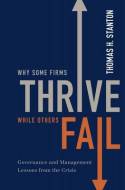Why some firms thrive while others fail
governance and management lessons from the crisis
- ISBN: 9780199915996
- Editorial: Oxford University Press
- Fecha de la edición: 2012
- Lugar de la edición: New York. Estados Unidos de Norteamérica
- Encuadernación: Cartoné
- Medidas: 24 cm
- Nº Pág.: 256
- Idiomas: Inglés

Why did some firms weather the financial crisis and others not? This book builds on the author's interviews and access to internal documents from over a dozen major financial companies, investigates their workings, reveals what went wrong and discovers a remedy. A critical difference between successful and unsuccessful firms is a culture that encourages respectful challenge, what the book calls <"constructive dialogue.>" At successful firms top management engaged in constructive dialogue with the board, a strong management team, and the chief risk officer, among others, in making a decision; firms that failed often featured overbearing (or distracted) CEOs or unit heads, supine boards, incapable management, ineffective risk officers, and poor communications both across silos and up the hierarchy. They often lacked ability to manage the firm as an integrated organization. Companies need good management, and not only good risk management, to stay out of trouble. Successful companies operated with strong information systems and a culture of good communications that brought issues promptly to top management so the company could adjust its operations accordingly. Successful managers had discipline to ask simple questions and pursue answers until they understood the risk-reward tradeoffs in their activities. Regulators too made mistakes. They didn't feel empowered to rein in companies that - at least before the crisis - seemed so profitable. Instead of waiting for a company to take losses, the book recommends that they use <"constructive dialogue>" as a test of good management and that supervisors require evidence that major business decisions result from a robust process rather than merely the will of a powerful CEO or heads of revenue-producing units. Companies in turn should use their regulator as a potential source of useful feedback. The book concludes by looking at major firms in other industries and finds that its conclusions apply to these companies too.







